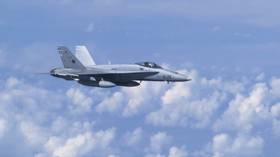NATO countries complain as planned Russian 5G testing near St. Petersburg could interfere with military aircraft systems – reports

Estonia and Latvia, two NATO member states, have objected to planned Russian 5G experiments that could interfere with their military aviation systems. The frequency band to be tested is currently used by the bloc’s aircraft.
According to Moscow daily newspaper Kommersant, citing an anonymous source, objections have also come from Finland, not a NATO member but a close ally of the bloc.
The problem has arisen following planned experiments by MTS, the largest mobile network operator in Russia, in the town of Kronstadt. Kronstadt is located on a small island in the Gulf of Finland near St. Petersburg, not far from both Helsinki and Tallinn. Russia plans to use 4.8-4.99 GHz frequencies for its 5G signal. In NATO countries, this frequency band is used by the friend or foe identification system on military planes, and Russia’s decision to allocate it to telecommunications could cause interference for hundreds of kilometers.
According to the newspaper, the Latvian, Estonian and Finnish authorities have not yet publicly commented on the situation.
Also on rt.com Russian Air Force experts publish plan to neutralize NATO forces in all-out war with bombing strikes against key military targetsIn recent years, Russian technology companies have been in battle with the country’s Ministry of Telecom and Mass Communications over the implementation of 5G, with the government refusing to let go of the 3.4-3.8 GHz band, currently used by the defense ministry for military and intelligence services. These frequencies are considered to be the most suitable for 5G. For example, Germany is using 3.6 GHz, right in the middle of the range.
Instead, the ministry proposed that Russian communications companies use the 4.4-4.99 GHz frequencies, overlapping with those used by NATO planes.
In October, speaking to Prime news agency, Rostelecom boss Mikhail Oseevsky revealed that these frequencies will prevent Russia from covering lots of its European territory with 5G, noting that aircraft warning systems operate in this range. The deployment of 5G in areas 300km from the border requires permission from neighboring states, which Moscow is unlikely to be able to obtain.
“Therefore, it is clear that the area 300km from the western borders and from Turkey will not be covered by 5G – most of our European territory. This zone extends almost to Moscow, and nothing can be built in St. Petersburg,” he noted.
Also on rt.com American troops in Germany serve our ‘mutual interest,’ Berlin says, after Biden freezes planned withdrawalIn July 2020, MTS became the first Russian company to receive a license to provide 5G services, operating on 24.25–24.65 GHz band, which the company president, Alexey Kornya, called “one step closer to a new era in the history of communications.”
Think your friends would be interested? Share this story!













